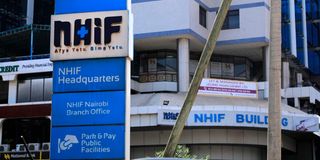Premium
EACC wants 8 prosecuted in Sh199m health scandal

The offices of the now defunct National Hospital Insurance Fund in Nairobi.
What you need to know:
- The official allegedly demanded the bribe to ensure a favourable ruling for an individual who had been booked at Soweto Police Station for illegal waste dumping.
- The anti-corruption watchdog forwarded 52 files to the DPP for review. Out of the 51 files, 47 of them are recommended for prosecution, two of them for administrative action, and two files for closure.
The anti-corruption watchdog wants eight individuals prosecuted for their alleged roles in a multi million-shilling scandal that saw taxpayers lose Sh199 million at the defunct National Hospital Insurance Fund (NHIF).
The cash was lost through manufactured claims and fictitious surgeries for which hospitals demanded payments.
Ethics and Anti-Corruption Commission in its quarterly report released this month says the directors and employees of Beirut Pharmacy and Medical Centre, registered doctors, and officials from defunct NHIF colluded to embezzle public funds by raising fictitious medical claims.
The officials include Mr Peter Kamunya (Former NHIF CEO) and Mr Amran Mohamed (NHIF Branch Manager-Eastleigh). The two officials signed a contract for Beirut before the gazettement and declaration by the NHIF board.
Others are Halima Saney (Senior Assistant Manager), Doughlas Odhiambo (Manager of Quality Assurance and Contracting), and John Ireri (Kenya Medical Practitioners and Dentists Council (KMPDC) Deputy Director in charge of licensing and accreditation.
They are accused of upgrading the facility from level 3 to level 4 without a valid contract and gazette notice. They also failed to undertake due diligence in the licensing of Beirut leading to faulty registration.
The rest are Yussuf Harret, Mohamed Bare, and Ubah Hussein Hussein Gamow who are the directors of Beirut Pharmacy and Medical Centre who colluded with the NHIF officials.
“Investigations established that the CEO, manager of quality assurance, and other public officials at NHIF irregularly awarded a contract to Beirut Pharmacy and Medical Centre before the institution had been gazetted as a health facility. The investigations also established that the directors of the said institution submitted false documents to the NHIF and the Kenya Medical Practitioners and Dentists Council,” read the report.
The officials are to be charged with 17 counts of willful failure to comply with the law relating to public funds management contrary to Section 42(3) as read with Section 48(1) of the Anti-Corruption and Economic Crimes Act (ACECA).
EACC has also said they are to be charged for the offence of deception, abuse of office, uttering a false document, and conspiracy to commit an offence of corruption and fraudulent acquisition of property.
The health facility was featured in an NTV exposé that saw the licenses of five other hospitals suspended for 90 days in June 2023 following claims of medical fraud.
The Nation had uncovered the scheme in which fraudsters posing as health care providers, in the name of the NHIF, duped hapless residents in villages scattered across Meru County, promising to save them from the vagaries of arthritis complications.
The quarterly report also highlights how Nairobi City Water and Sanitation Company (NCWSC) lost millions of shillings following a web of corruption involving senior officials and some officials using forged documents.
They include a switchboard operator who made Sh14.6 million in salaries after they used forged academic documents to secure employment.
The rot at the NCWSC does not end with payroll fraud. The report also highlights tender irregularities whereby certain officials are alleged to have interfered with the procurement to favor specific firms.
In a particular case, an official from Nairobi Water was found to have asked for an Sh40,000 bribe from a private citizen to influence a decision to charge another person for an offence of illegal dumping.
The official allegedly demanded the bribe to ensure a favorable ruling for an individual who had been booked at Soweto Police Station for illegal waste dumping.
The anti-corruption watchdog forwarded 52 files to the DPP for review. Out of the 51 files, 47 of them are recommended for prosecution, two of them for administrative action, and two files for closure.



